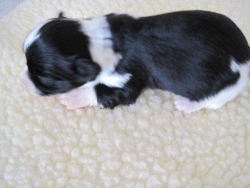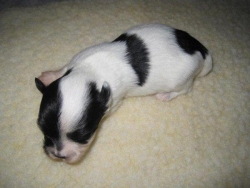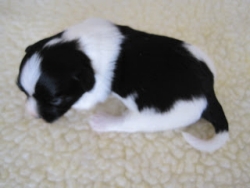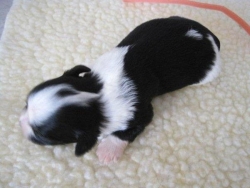
More about white spotting
On the surface there appears to be no rhyme or reason to white markings/spotting and the extent they appear on a Havanese; however, they are not nearly as random as they seem. The extent of white and its placement on a dog follows a very well defined order.
White basically progresses from the outside in, and bottom up. If there is only a little white, less than 10%, it will be always be found on the chin, chest and feet. If there is more white, about 20%, it will be found as larger areas of white in these same places plus perhaps a forehead spot, or white tail tip. These relatively small amounts of white are often seen on dogs we call white trimmed. Moving on, 30% white can enlarge each of these areas again and adds in a white belly, partial white collar and a face blaze. 40% white is even more so, with a broader white collar. Dogs with this moderate amount of white are known as Irish Pied. The white patches continue to grow. Half and half dogs with an almost even division of white and colour are sometimes identified as lightly marked Pied or heavy marked parti. Dogs with more than 50% white are called Particolour. And the white continues to grow until the dog is mostly white with irregular coloured patches on head, body and rump. As it goes on, there are progressively smaller colour patches on the head and top half of the body. Finally only small coloured patches on the head and back remain, maybe an eye patch, one ear and a small spot on the back. In the progression of white, the ears are last to hold colour. You will never see a white Havanese with black socks and a black tail.






The puppies below are good photo examples of progressive degrees of white spotting. All these variations can occur within one litter.
Irish Pied

Particolour


